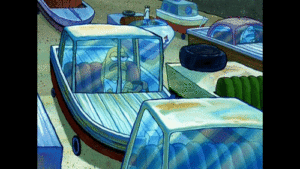I want you to imagine for a moment that you have never seen rain. Imagine you are an alien from another planet, visiting earth for the first time. You’re sitting on a human’s front porch, looking out into the world, and seeing what this “Planet Earth” is all about.
Just then, an extraordinary sight suddenly appears before you. Water, tons and tons of water, begins to fall from the sky. It touches everything you see, landing with an kamikaze-like energy. Each drop changes the colors of the earth and trees, polishes the grass, and shakes the leaves as it lands. New rivers begin to form in the streets and gutters, carrying mud and leaves and who knows what. You reach your hand out and can see each drop landing on your skin, exploding in its refreshing coolness and stunning patterns and refractions of light.
It is incredible, and still the water keeps coming and brings with it a litany of sounds, as millions of little drops practice their drumroll on the ground. The light is transformed, the world is transformed, and you, too, will never be the same with the knowledge that you now live in a world where such things are possible.
Can you imagine? The wonder, the joy, the amazement over such a phenomenon? Can you imagine your ears, eyes, and skin becoming so alert and alive to the symphony of sensations before them?
This is what it means to truly be awake and alive in the moment. This shift in perspective is our gateway to happiness, and if we want it to last, we must understand how it works and what gets in the way.
The Art of Living
Seeing the world anew each day is what the great philosopher Alan Watts called this shift the art of living, which “consists in being sensitive to each moment, in regarding it as utterly new and unique, in having the mind open and wholly receptive.” You might call it beginner’s mind, presence, mindfulness, or living an embodied life. Either way, it is the path to the happiness we all seek, and the greatest obstacle we face on this path is when we forget the miracle of being here.
Losing out on the joyful wonder of the world is something every human being experiences. We tend to romanticize our childhoods because we want to return to that time when everything was new and around every corner was another incredible discovery.
We lose out on this wonder as we grow older, taking the world for granted. Our lives become stuck in ruts; we feel like each day is the same-old same-old. We wake up to the same person, eat the same breakfast, go to the same job at the same office, and come home to watch the same television shows before going to sleep at the usual time.

This is a natural phenomenon that neuroscientists and psychologists refer to as automation or habituation, and it is perhaps the greatest obstacle to happiness. In psychological terms habituation is “a decrease in response to a stimulus after repeated presentations.” In layman terms, we get bored. The things that brought us happiness no longer do, they just become the way things are.
Unfortunately, when we automate the world, and we do everything merely out of habit, we miss out on the richness of experience available to us right here, right now. Our way back to happiness is to not let this automation become, well, automated. Instead, we must take conscious control of our mind’s attention and tap into the beauty that is all around us, in each and every moment.
Let us first examine what automation is, then we will discuss when it is useful and when it is not. Lastly, we’ll look at how to break out of it and what happens when we do.
How it starts
Before I get into why automation robs us of happiness and what we can do about it, I should first point out that automation can be a good thing, and is even necessary for our survival. Automation is necessary for many parts of our lives and can be like oil to the movements of our lives: it keeps everything running smoothly.
Think back to when we were children. We spent a lot of time learning to walk, and we fell down a lot in the process. Slowly, however, we learned how to balance, how to place one foot in front of the other, how to shift our weight forward, what muscles to engage, where to focus our gaze, and so on. Now, we can walk down the street without giving it a second thought. We can even walk while talking or eating or looking around. Life would be a harrowing experience if we all needed to focus on our walking to make sure we didn’t fall over.
The same process happened when we learned to drive, as we figured out how much pressure to apply to the brake and gas pedals, where to put our hands, how the mirrors worked, and, perhaps, how to shift gears. With enough practice, the mind automated all these processes, so now we can drive to work while listening to an interesting podcast or chatting with a friend. If everyone had to focus on driving each time they sat behind the wheel, there would be many more accidents–it could even make driving altogether impossible and too risky.
Automation, then, has an important role in our lives, and can help us perform a number of functions, whether they are walking, driving, biking, or cooking. But when it comes to noticing the uniqueness of the world around us, savoring our experiences, and appreciating the things we have, automation becomes incredibly counterproductive.
When it becomes a problem
A few weeks ago on the blog, I talked about the dangers of automation when it applies to the partners with whom we fall in love. For most people, the beginning of a relationship is full of happiness and joy. Much of this is fueled by the novelty of being with someone new, as well as the excitement of exploring new things and learning about this incredible person we just met.
But, as we get to know somebody, and as our experience with them becomes more and more based on routine, our brain automates them, too. We stop seeing them as extra special and exciting, instead just considering them part of normal, everyday life. We begin to take our partners for granted, often forgetting why we even fell in love with them in the first place.
If, on the third date, our partner cooks us a delicious dinner, we see that as a nice and kind gesture. Five years into the relationship, on the other hand, we expect it; it just becomes something that happens. Then, if they forget to make dinner or order a pizza, we might come to the opposite conclusion, deciding that they may have been just pretending to be nice at the beginning.
Many people in relationships fail to realize that the problem is not their partner, it is their mind. My recent conversation with Buddhist teacher and clinical psychologist, Dr. Cheryl Fraser, covered this phenomenon. People experience a sense of boredom with their long-term partners, and often blame the partner, rather than seeing it as a natural phenomenon of the mind to automate its surroundings.
The solution to falling back in love with a partner is the same solution to falling back in love with life: we have to learn how to pay attention. We must realize not only that each day is new, but that each moment is a miracle, existing only once and then never again.
Our partner is not the same person they were yesterday or twenty years ago, they are continually changing, a dancing and vibrating miracle of matter. They are like the rain that inspires us, the waterfalls that cool us, and the sun that shines on us.
Awareness is poetry
Some call the concentrated awareness of the present moment mindfulness, you might also think of it as cultivating a beginner’s mind. But I prefer to call it poetry, because anybody becomes a poet if they truly pay attention. “Poetry can be written by anyone paying attention,” as Andrea Gibson and Megan Falley wrote in their book, How Poetry Can Change Your Heart. The English poet D. H. Lawrence even called his poems “acts of attention.”
Once we do pay attention, life itself becomes poetry, our very flesh becomes a great poem. Any embodiment practitioners can tell you the transformational experience they have when they move slowly and really pay attention. Whether it is walking, meditation, qi gong, or yoga, practicing moment-to-moment awareness of slow and methodical movements shifts our perspective to the joy of the here and now.
The Vietnamese monk Thich Nhat Hanh, who I have mentioned a few times on this blog, also talks a lot about turning our meditation practice into a great poem. He writes that by “going home to the breath, we regain the wonder of the sunrise.” He encourages us to practice walking meditation, as if our feet are kissing the Earth. Even his words are like poetry; in Peace in Every Step, he writes:
I have lost my smile,
but don’t worry.
The dandelion has it.
While we mostly live in a world of our own thinking and can so easily get caught up in our emotions, we are actually connected to this world through our senses. The more we feel into our bodies, the more we are able to connect to the world around us.
Once we come into our bodies, we come into the moment, once we come into the moment, we discover each one is a poem. Each breath is a poem. A cloud becoming the sky by dropping a lake’s worth of water onto a town is a poem. So is a line from the poet Anis Mojgani, “your heart beats nine hundred times a day, and there are enough gallons of blood to make you an ocean.” Each heartbeat, maple leaf, and movement of the clouds is a miracle, along with every hour of the light and dark.
This brings us back to the greatest obstacle to our happiness: falling asleep. From a spiritual perspective, most people are considered to be asleep, propelled by unconscious processes, living in a clouded mind that obscures the shining light of awareness.
Not tuning into our inherent wakefulness, and letting day-to-day society deaden and numb us until we forget to see the beauty around us. Thinking that nothing changes, when, in fact, everything is in constant flux and transformation. This makes every moment–every kiss, smile, and movement of the trees–precious.
Once we learn to truly pay attention, a natural happiness arises. As Chögyam Trungpa put it in Smile at Fear, “this experience of joy and unconditional healthiness is the basic virtue that comes from being what we are, right now.”
So, the next time it rains, put down your phone, close the laptop, go outside, clear your mind, open your heart, feel into your body, and be in the moment. Allow experience and experiencer to unite as one, and your true blissful nature will reveal itself, just as the sun will once this miracle has passed.









